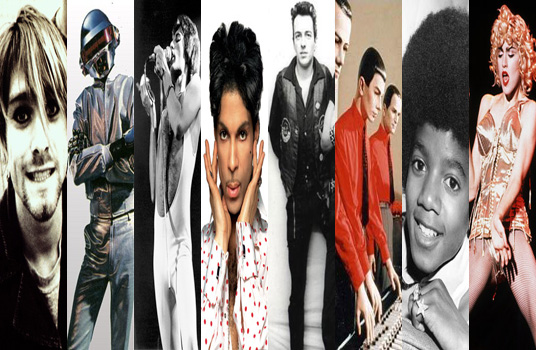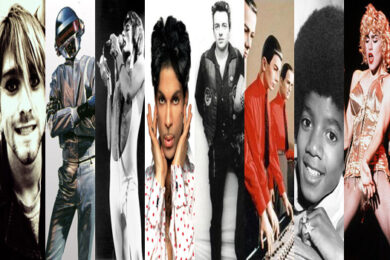The Quietus thought we would commission a bootleg of our own and in doing so, accidentally found out that we had beaten the world record for number of samples used in one track (Easily the most proficient on the album front is Girltalk but even DJ Earworm struggles to get more than 25 songs into one track.) Which is nice. So our thanks go to our friend DJ Osymyso who concocted this perplexing sonic puzzle which draws its sources from the last 35 years’ of music to represent the wide spread of genres that The Quietus will cover. If you fancy the chance of winning a brand new iPod Touch, all you need to do is have a stab at naming all the tracks that make up The Quietus Mix and enter using the form at the foot of this page.
LISTEN to the mix. UNTANGLE and enter our contest. WIN an iPod Touch:
While his brain was being turned into singing scrambled egg by the devilish complexity of trying to unravel track from track, John Doran tried to restore a sense of order by looking at the history of the bootleg which, he writes, extends far further back than rooms full of people going potty to the skills of a pair of Belgians back in 2001.
The mash-up is the sound of a digital Nero fiddling as the music industry burns. Or at least that seems to be the received wisdom about a genre that appears to rely on illegal downloading. Yet the bootleg, which traditionally consists of the music from one track mixed expertly with the vocal line or a cappella from another, is not as young as it might initially seem. This way of acting fast and loose with the lyrical and melodic content of a song is not only older than the digital revolution but as old as music itself. It is in fact music’s natural level when not shielded by the artificial protection of copyright laws – a false oasis for musicians in the second half of the 20th Century. In the free market of Jamaica’s pop industry what was bad for the musician was good for the producer and the consumer – check Althea and Donna’s versioning of Marcia Aitken’s ‘I’m Still In Love’ to make their international hit ‘Up Town Top Ranking’, or Jackie Mittoo’s free and easy ways with bending The Beatles to the protest against sufferation. Likewise, as WIRE magazine pointed out recently in its primer for digital dancehall, it’s actually impossible to list the full amount of ‘versions’ of Wayne Smith’s ‘Under Mi Sleng Teng’
But this isn’t just a matter of laissez faire economics in foreign climes. Led Zeppelin’s shoddy habit of stealing traditional blues numbers and converting them into cash cows via their ‘trad/arr. Zepp’ sleight of hand is nothing short of daylight robbery. The entire backbone of hip hop follows the same creative route (albeit with slightly better ethics) from Kool Herc’s block party breakdown beat juggling through ‘Grandmaster Flash On The Wheels Of Steel’ to Coldcut’s masterful ’70 Minutes Of Madness’.
It would also be wrong to suggest that this is even a 20th Century or pure pop occurrence. Early examples of the mash up (a supposedly post-modern occurrence) can be found in the classical practice of re-arranging traditional folk material and quodlibet as well as the jazz reinterpretation of standards. Not even the avant garde was safe from this form of populism, cropping up, as it did, in musique concrete. Of course, what’s good for the awesome goose is likewise true for the piss poor gander. Most people reading this will be old enough to remember either Stars on 45 or Jive Bunny. This said, when the bootleg phenomenon started hitting the neon drenched flesh pits of the UK’s club land in 2001, it really did feel like something ‘punk’ was happening. The development of popular music in the 20th Century had mirrored that of a model of economic take off with the first flash point being the mass production of affordable electronic guitars and amplifiers and peaking with availability of cracked software like Soundforge or Acid Pro for home computers meaning anyone could produce their own tunes at home. The punk ethos as stated by Mark Perry: ‘Here is a chord . . . Here is another . . . And here is another, now go and form a band’ in the 21st Century could be ‘Here is a cracked copy of Soundforge . . . now go and make a bootleg’.
Although quite common through the 1990s (one off dance hits such as DNA’s remix of Suzanne Vega’s ‘Tom’s Diner’ and the Timelord’s ‘Doctorin’ The Tardis’) the booty really came into its own around the turn of the century. The first notable mash up of the naughties was Freelance Hellraiser’s ‘A Stroke Of Genie-us’ roughly marrying The Strokes and Christina Aguilera. Of course this was all completely illegal and it was Richard X’s reworking of his own bootleg featuring Tubeway Army and the Sugababes (standing in for Adina Howard) called ‘Freak Like Me’ that was the genre’s first bona fide smash hit – and most importantly, a great song in its own right. Several albums of note have been thrown up including the excellent As Heard On Radio Soulwax Part 2 by 2ManyDJs, and Dangermouse’s deft combination of Jay-Z and The Beatles to produce The Grey Album.
Spot all 50 tracks that comprise the The Quietus Mix and win an iPod Touch. Full details available here



